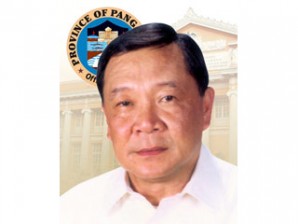Pangasinan governor tied to ‘jueteng’
Pangasinan Gov. Amado Espino Jr. has earned up to P900 million in protection money from “jueteng” operators in the province, said a town mayor who himself admitted to involvement in the illegal numbers racket.
The mayor, who described himself as Espino’s “trouble shooter,” has executed an affidavit detailing the proliferation of the underground lottery in Pangasinan.
The Philippine Daily Inquirer obtained his unsigned affidavit from the mayor’s camp, but he asked not to be identified for security reasons.
The mayor has asked protection from Interior Secretary Manuel Roxas, who is set to hold a press briefing Friday morning at Camp Crame, national police headquarters in Quezon City, regarding the mayor’s revelations.
In his affidavit, written in Filipino, the mayor said Espino was the “big boss” of the gambling syndicate running jueteng operations in the province.
He claimed the governor has been receiving P10 million a month from the operators of the illegal numbers racket.
“I am voluntarily disclosing what I know to stop the illegal gambling operations in Pangasinan and the activities of our governor which are against the law,” the mayor said.
He said he was planning to use his testimony in the plunder case he would file against Espino “to make him answer for violating the law.”
According to the mayor, he had personal knowledge of Espino’s role in the operations of jueteng in the province since he himself had personally delivered the governor’s weekly take from jueteng.
He said Espino, a retired police officer, started receiving protection money from illegal gambling syndicates when he served as Pangasinan police director in 1988.
The mayor, also a retired policeman, said he came to know the governor through his brother who used to serve as Espino’s intelligence officer when he was still in the police service.
When he won a congressional seat in the province’s second district in 2001, Espino assigned him to collect P3 million a month from jueteng operators Romy Lahara and Lito Millora, the mayor said.
He said Lahara and Millora had given him P750,000 in cash every Saturday which he would then deposit in Espino’s personal account at a Security Bank branch in Dagupan City.
“If a month has more than four Saturdays, Espino would receive more than P3 million a month,” he said.
The mayor said Espino gained control of jueteng operations in the province when he was elected governor in 2007.
“(When he became governor), we decided to directly handle the operations of jueteng. Governor Espino had a direct control in the operations of jueteng and assigned himself ‘Big Boss,’” he said.
“Jueteng operators had a direct communication with Espino and he himself run the entire operation.”
To help him manage the illegal numbers racket, Espino sought his help, the mayor said. Millora, Fernando “Boy Bata” Alimagno and Bong Cayabyab also helped them run the illegal numbers game.
But they were forced to temporarily stop the daily jueteng draws in the province when Archbishop Emeritus Oscar Cruz appeared in a Senate inquiry in September 2010 and disclosed that the underground lottery had become rampant in Pangasinan.
During the Senate probe, Cruz identified the governor as among the local officials who had been operating jueteng in their areas.
In a previous interview with the Inquirer, Espino vehemently denied the allegations against him, dismissing Cruz’s revelation as “a big lie.”
But the mayor said the governor was able to revive the jueteng operations in Pangasinan through the help of Charlie “Atong” Ang, a gambling personality.
He said Alimagno introduced Ang to Espino last year. In a meeting at the Capitol Resort Hotel in Pangasinan, the mayor said Ang promised the governor P8 million in monthly protection money.
The mayor said Ang then put up jai alai operations in Pangasinan which they used to hide the jueteng draws.
“I was assigned to explain to the mayors the new systems of Atong Ang. We had a meeting wherein Ang himself explained his operations to the mayor,” he said.
Jai alai cover
“Because of that meeting, we were able to revive the operations of illegal gambling in Pangasinan which continue until now. What we used to call jueteng is now known as jai alai.”
Two months before he died in a plane crash last August, then Interior Secretary Jesse Robredo ordered the administrative relief of the chiefs of police of Alcala and Santo Tomas towns for their failure to stop jueteng operations in their jurisdictions.
It is usually the poor who place bets in jueteng, which has become a multi-billion industry. The game is played mainly in Luzon.
Sen. Miriam Defensor-Santiago said in 2010 that the annual collections of jueteng operators at the time had reached P30 billion.
Santiago said “the prime beneficiaries and ultimate protectors of jueteng” then were the interior secretary and the police chief.
Last September, Sen. Panfilo Lacson, a former Philippine National Police chief, said a regional director of the PNP, who protects operators of the illegal numbers racket, could receive between P2 million and P3 million a month.
Lacson said a PNP provincial director could get between P500,000 and P1.5 million a month.
